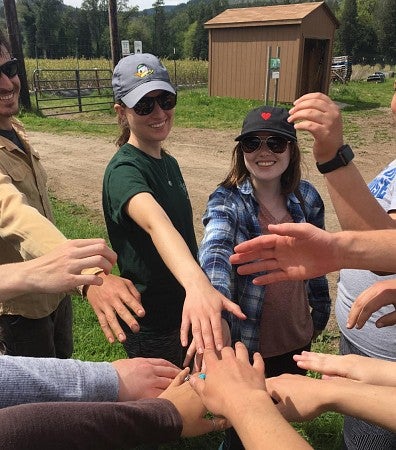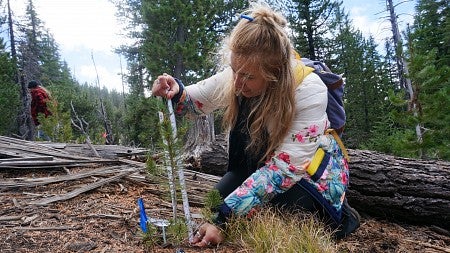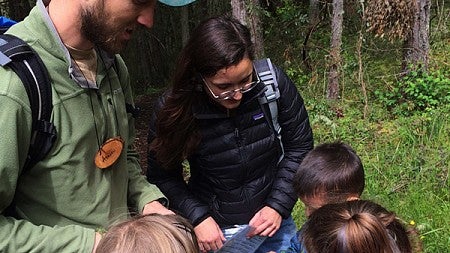Providing the skills, confidence and inspiration to make a difference!

The Environmental Leadership Program is an interdisciplinary community-based learning program that matches student teams with non-profit organizations, government agencies and businesses to address community-defined environmental issues. With the overarching objective of developing reciprocal and mutually-beneficial partnerships between students and community organizations, our goals are to provide:
Our goals are to provide:
- Undergraduate students with unique and practical learning experiences that develop their professional, leadership, technical, problem-solving, collaboration, and communication experience and skills;
- Graduate students with project management, mentoring, and team-building experience and skills; and
- Organizations with high-quality services that further their missions.
Our projects take place primarily on the traditional homelands of the Kalapuya peoples. We recognize this land acknowledgement is just a starting place–an invitation for us to consider what our settler-colonial history means for our pedagogical practices and our community-based work, as well as inspiration to redouble our efforts to develop courses and community-based projects that promote environmental and social justice.
Projects
We develop our projects cooperatively with community partners. Depending on partners’ needs, projects can address environmental education and outreach, natural resource management, habitat restoration, species conservation, environmental monitoring, sustainable business practices, ecotourism, recreation management, environmental justice, and other topics.
Currently, we have four primary focal areas.

In our Conservation Science in Action projects, students assist community partners by completing hands-on restoration projects, creating assessments and management plans, or acquiring and analyzing needed environmental data.

In our Environmental Education projects, students develop, implement, and share transformative learning experiences for children in nature. Students create scientifically rigorous curricula, teach programs in classrooms and conduct field trip activities.
In our Community Engagement and Justice projects, students work directly with communities to address our pressing environmental and social justice issues. Through methods such as oral histories, science communication, creative works and direct action, these projects seek to center and amplify voices that have often gone unheard and generate new approaches that build inclusive and resilient communities.
In our Sustainable Practices projects, students implement solutions that address and integrate concerns regarding environmental health, social equity, and economic success. Example projects include renewable energy, waste prevention and recycling, alternative transportation, sustainable business, and organic agriculture.
How to Apply
Applications are due Monday November 3rd, 9:00 a.m.
The Environmental Leadership Program is open to undergraduates with at least junior standing, although priority consideration will be given to Environmental Studies and Environmental Science majors, especially to students graduating in Spring 2026.
Because Dr. Katie Lynch is teaching in Italy then on sabbatical, there are no Environmental Education projects during the 2025-26 academic year. Check back Fall 2026 for the 2026-27 Environmental Education ELP projects! If you are interested in receiving credit for an internship related to environmental education, see the ENVS 404 Internships website. Local organizations that have offered environmental education internships in the past include Mt. Pisgah Arboretum, Nearby Nature, Partners for Sustainable Schools, School Garden Project, Whole Earth Nature School, and WREN.
Spring 2026 Projects
CONSERVATION SCIENCE PROJECTS
2026 Restoration & Research: Reforestation AND 2026 Restoration & Research: Pollinator
This year, our long-term Restoration & Research project will have 2 teams, both partnering with Whitewater Ranch and the UO Ponisio Lab! With the overall goals of providing shade for Goose Creek and habitat for pollinators, ELP teams have been implementing and maintaining a riparian restoration project at an organic farm—Whitewater Ranch—since 2014. The plantings are thriving, so both teams will continue transitioning the project to “free to grow” status by interplanting, removing weed mats, controlling non-native blackberry, and creating pollinator patches. In addition, the R&R Pollinator team will focus on collecting data in research plots examining ways to enhance pollinator populations after major disturbances such the September 2020 Holiday Farm Fire and post-fire timber harvest. The R&R Reforestation team will establish plots and collect baseline data for a new study examining how native “nursery cover” plants can assist in Douglas-fir seedling establishment while providing floral resources. These projects will build upon the 2023-25 Restoration & Research teams’ work (as well as the 2014-2022 Sustainable Farms, Riparian Restoration, Promoting Pollinators teams’ work). Students participating in both projects will learn about riparian restoration methods, field-based experimental design, data collection methods and plant identification. This project is particularly well-suited for students interested in ecological restoration, pollinator conservation, natural resource management or forestry, including (but not limited to) ESCI majors with the Life Sciences focal area.
NEW! Floodplain Function
Floodplains improve water quality, slow floodwaters, recharge aquifers, and provide important fish and wildlife habitat. Unfortunately, people have channelized many streams and rivers, disconnecting waters from their from historic floodplains. In 2025, multiple conservation organizations restored the floodplain at Quartz Creek in the McKenzie Watershed. In partnership with McKenzie Watershed Council, U.S. Forest Service, and McKenzie River Trust, this team will conduct post-project monitoring to assess changes in hydrology and substrate. Students will learn about floodplain restoration methods and how to evaluate in-stream physical characteristics, so this project is particularly well-suited for students interested in river and fish conservation, including (but not limited to) ESCI majors with the Earth & Physical Science focal area.

